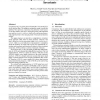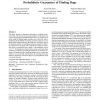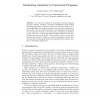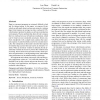26 search results - page 2 / 6 » Randomized active atomicity violation detection in concurren... |
134
Voted
ASPLOS
2006
ACM
15 years 8 months ago
2006
ACM
Concurrency bugs are among the most difficult to test and diagnose of all software bugs. The multicore technology trend worsens this problem. Most previous concurrency bug detect...
117
Voted
ASPLOS
2010
ACM
15 years 9 months ago
2010
ACM
This paper presents a randomized scheduler for finding concurrency bugs. Like current stress-testing methods, it repeatedly runs a given test program with supplied inputs. Howeve...
202
click to vote
ASPLOS
2009
ACM
16 years 3 months ago
2009
ACM
Multicore hardware is making concurrent programs pervasive. Unfortunately, concurrent programs are prone to bugs. Among different types of concurrency bugs, atomicity violation bu...
127
click to vote
CAV
2008
Springer
15 years 4 months ago
2008
Springer
We study the problem of monitoring concurrent program runs for atomicity violations. Unearthing fundamental results behind scheduling algorithms in database control, we build space...
146
Voted
EUROSYS
2010
ACM
15 years 11 months ago
2010
ACM
Bugs in concurrent programs are extremely difficult to find and fix during testing. In this paper, we propose Kivati, which can efficiently detect and prevent atomicity violat...




